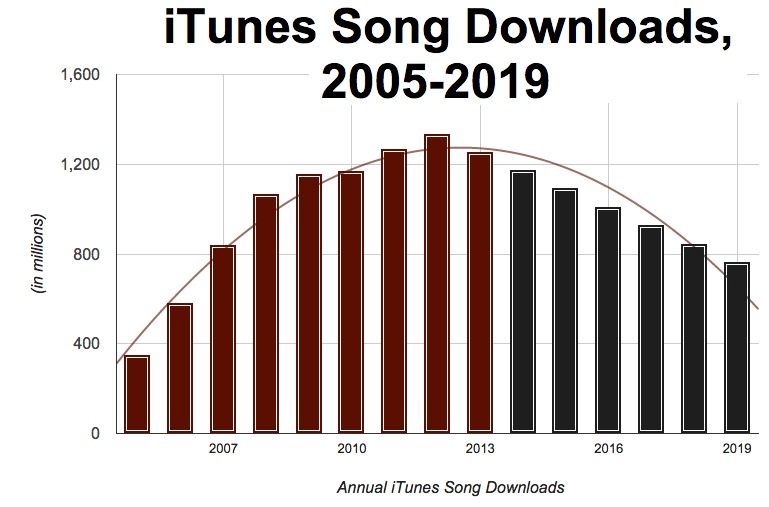by Paul Resnikoff
Apple is preparing to abandon music downloads.
Apple is now preparing to completely terminate music download offerings on the iTunes Store, with an aggressive, two-year termination timetable actively being considered and gaining favor.  According to sources to Digital Music News with close and active business relationships with Apple, discussions are now focused “not on if, but when†music downloads should be retired for good.
The sources insisted on confidentiality and required that all conversations be conducted outside of email or any written medium, given the realistic fear of reprisals for sharing details of internal corporate discussions.
Back to the story, the sources indicated that a range of shutdown timetables are being considered by Apple, though one executive noted that “keeping [iTunes music downloads] running forever isn’t really on the table anymore.† Also under discussion is a plan to “ride the [iTunes music download offering] out for the next 3-4 years, maybe longer,†when paid music downloads are likely to be an afterthought in a streaming-dominated industry.
Since publication of this story on Wednesday, Apple has issued a rare denial of reported shutdown proposals.
Part of the debate is that paid music downloads still account for hundreds of millions of dollars to Apple, worldwide.  According to an estimate revealed by music industry analyst Mark Mulligan at Canadian Music Week in Toronto, iTunes music downloads will still be worth an estimated $600 million in 2019, though that is down from peak revenues of $3.9 billion in 2012.
“If he were alive, Jobs would have killed it,†one source bluntly stated (and he’s probably right).
But this is a ship that is sinking, fast.  “Last year downloads declined by 16% in nominal terms,†Mulligan noted.  “This year they are tracking to decline by between 25% and 30%.â€
Earlier estimates by Digital Music News projected song download revenues closer to the $750 million mark, though that could be overly-optimistic given recent declines.
Steve Jobs.
Lingering large is the ghost of Steve Jobs, who created a culture of aggressively phasing products out in favor of new ones, even if the older products were still earning money.  That bleeding edge approach of activelycannibalizing Apple’s own products is now legendary, and the stuff of only the gutsiest companies and CEOs.  Within the less renegade Apple of 2016, the question is whether current CEO Tim Cook is guilty of riding out the profits on a dying technology.  “If he were alive, Jobs would have killed it,†one source bluntly stated (and he’s probably right).
Apple Music Growth.
A critical piece of this puzzle comes from Apple Music, the subscription service launched last July that already boasts 13 million paying subscribers (as first reported by Digital Music News).  According to Mulligan, that number is surging towards 20 million by year end, with Apple’s streaming revenues surpassing peak music download revenues by 2020.  “By 2020 [Apple’s] download business would be tracking to be 10 times smaller than streaming revenue but, crucially, streaming revenue would nearly have reached the 2012 iTunes Store download revenue peak,†Mulligan estimated.
“This is the point at which Apple would choose to turn off the iTunes Store.â€
Product Confusion.
Weighing heavy on the decision-making process is a growing level of confusion amongst various Apple music properties.  Already, download purchases are leading to obnoxious and confusing tie-ins with Apple Music (and for more on that, read this).  Indeed, paying downloaders are being punished by a confusing traffic jam of overlapping offerings, not to mention wandering zombies like iTunes Match, iCloud, and other high-calorie components of iTunes’ ‘bloatware’ application.
Interestingly, the iTunes Store is almost looking like a microcosm of the issues that plagued a ‘Jobless’ Apple in the 90s, when endless computer models, printers, and other confusing peripherals and unnecessary products sagged the company’s profile and nearly plunged it into bankruptcy.  Perhaps this is the perfect time for another serious streamline in music (and other media properties), and a solid wave to the music industry’s past.
Global Considerations.
According to the same sources, Apple’s termination could be staggered depending on the country.  The reason is that rollouts and adoption rates can be completely different depending on the global region, with some countries yet to embrace streaming music (music less Apple Music).
According to one source, an initial shutdown could take place in ‘tier 1’ countries like the United States, UK, and leading countries in Europe and Asia, with ‘tier 2’ and ‘tier 3’ countries experiencing a staggered shutdown in subsequent years.
Label and Content Owner Considerations.
Another wrinkle comes from recording labels themselves, especially independent labels.  That group derives significant revenues from music download sales, and is expected to express significant displeasure against any ‘premature’ shutdown.  “It’s the past, not the future, but then you should know how the music business is,†one source ribbed.
Major labels, many of whom stand to gain handsomely from a meteoric rise in streaming, may be more supportive of the termination. Â Already, the entry of Apple Music appears to be bolstering music streaming overall, with Spotify thanking the company for pushing it past 100 million users. Â In that light, streaming music could enjoy even greater growth with a product clarification and streamlining from Apple.
On that front, top Apple Music executive Jimmy Iovine, a longtime fixture Universal Music Group before migrating to Apple Music, could play a key diplomatic role in the termination and transition.










